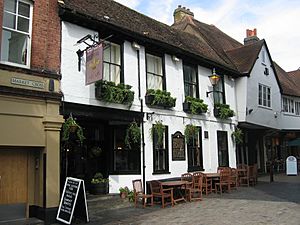Fleur de Lys, St Albans facts for kids

The Fleur de Lys was a famous old building in French Row, St Albans, England. It used to be a type of restaurant and gathering place called a public house, or "pub." Even though its front looks like it was built in the 1700s, the building is actually much older, dating back to the Middle Ages! Because it's so old and important, it's officially protected as a grade II listed building by Historic England. In 2007, the building was updated and given a new name, The Snug, becoming part of a group of similar places called the Snug bar chain.
Contents
A Look Back in Time
This building has stood for hundreds of years, since the time known as the Middle Ages. This was a long time ago, between the 5th and 15th centuries. Imagine all the history and stories this building could tell! It has seen many changes in St Albans over the centuries.
What is a Public House?
A public house, often called a pub, is a traditional place in Britain where people can meet, eat, and drink. For many years, pubs have been important community spots. They are often historic buildings that have served as meeting places for local people for a very long time.
The Fleur de Lys Symbol
The name "Fleur de Lys" means "lily flower" in French. It's a very old symbol that looks like a stylized lily or iris. This symbol has been used for centuries, especially in France, often linked to royalty and important families. Seeing it on the pub's sign connected the building to a long history of art and symbols.
Protecting Old Buildings
The Fleur de Lys building is a "Grade II listed building." This means it's considered very special and important because of its history or architecture. Historic England is an organization that helps protect these old buildings across the country. Being listed means that any changes to the building must be carefully planned to keep its historic look and feel.
A New Chapter
In 2007, the old Fleur de Lys got a new look and a new name: The Snug. It became part of a chain of modern bars. While its purpose changed a bit, the building itself still stands as a reminder of St Albans' long and interesting past. It continues to be a place where people gather, just as it has for hundreds of years.

